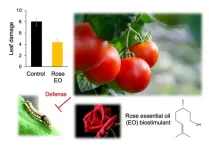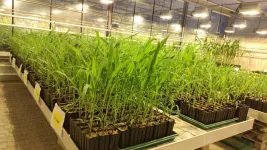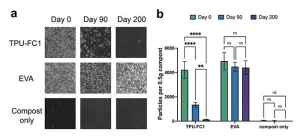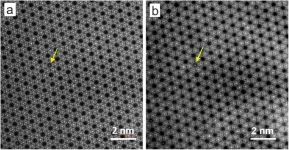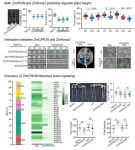Plants-derived essential oils (EOs) find applications in various industries, such as detergents, cosmetics, pharmacology, and food additives. Moreover, EOs have an exceptional safety profile, and their numerous bioactivities greatly benefit human health. Beyond these benefits, EOs have also been found to illicit insect-repellent responses by inducing neurotoxic effects.
Terpenoids are abundant in plant EOs and have garnered widespread attention as they can regulate plant defense responses by regulating the expression of defense genes. For example, soybean and komatsuna plants, when grown near mint, experience a significant improvement in defense properties and become resistant to herbivores. This phenomenon occurs through a process known as “eavesdropping,” wherein volatile compounds are released from the mint plant. These volatile compounds trigger the activation of defense genes, protecting against potential herbivore threats.
Today, applying chemical pesticides is the method of choice for crop protection, but the damage they cause to the environment and ecosystems, along with the need to increase food productivity, stresses the need for safer alternatives. Thus, there is an urgent need for investigation of plant defense potentiators. In this regard, the availability of EOs makes them attractive candidates as environmentally friendly plant defense activators. However, there is a lack of sufficient proven examples to meet the demand.
To address this, a research team led by Professor Gen-ichiro Arimura from the Department of Biological Science and Technology at the Tokyo University of Science (TUS) assessed the efficacy of 11 EOs in activating tomato defense responses. “EOs used as fragrances for various purposes contain odor components, which may have the ability to work like volatile compounds in conferring pest resistance. We aimed to investigate the effects of these EOs on plants’ insect pest resistance,” says Prof. Arimura. The team’s findings were published in the Journal of Agricultural and Food Chemistry on March 18, 2024.
The team profiled the effects of terpenoid-enriched EOs on tomato plants. They applied ethanol-diluted solutions of 11 different EOs to the soil of potted tomato plants, performed molecular analyses to study the gene expression inside leaf tissue, and observed that rose EO (REO) increased the transcript levels of PIR1 and PIN2, the genes involved in plant defense. Additionally, tomato plants treated with REO exhibited reduced leaf damage caused by the Spodoptera litura (a moth species) larvae and Tetranychus urticae (a mite pest). Furthermore, to explore the possibility of broader application, the researchers conducted a field experiment to measure REO activity in field conditions. They observed a 45.5% reduction in tomato pest damage compared to the control solution. The researchers believe that REO could serve as a viable alternative to pesticides during the winter and spring seasons when pest infestation is less severe and could potentially reduce pesticide usage by almost 50% during summers.
Explaining the research findings, Prof. Arimura says, “REO is rich in β-citronellol, a recognized insect repellent, which enhances REO's efficacy. Owing to this, damage caused by the moth larvae and mites was significantly minimized, confirming REO as an effective biostimulant. The findings also showed that a low concentration of REO did not repel T. urticae but attracted Phytoseiulus persimilis, a predator of these spider mites, thus exhibiting a dual function of REO.”
Overall, the study highlights the role of β-citronellol-enriched EO in activating defense genes in tomato leaves. Additionally, it provides evidence that REO is an effective biostimulant for enhancing plant defense against pests, which is also safe as it does not lead to phytotoxicity or leave any toxic residues behind. “Our study suggests a practical approach to promoting organic tomato production that encourages environmentally friendly and sustainable practices. This research may open doors for new organic farming systems. The dawn of potent environmentally friendly and natural pesticides is upon us,” concludes Prof. Arimura.
***
Reference
DOI: https://doi.org/10.1021/acs.jafc.3c08905
About The Tokyo University of Science
Tokyo University of Science (TUS) is a well-known and respected university, and the largest science-specialized private research university in Japan, with four campuses in central Tokyo and its suburbs and in Hokkaido. Established in 1881, the university has continually contributed to Japan's development in science through inculcating the love for science in researchers, technicians, and educators.
With a mission of “Creating science and technology for the harmonious development of nature, human beings, and society," TUS has undertaken a wide range of research from basic to applied science. TUS has embraced a multidisciplinary approach to research and undertaken intensive study in some of today's most vital fields. TUS is a meritocracy where the best in science is recognized and nurtured. It is the only private university in Japan that has produced a Nobel Prize winner and the only private university in Asia to produce Nobel Prize winners within the natural sciences field.
Website: https://www.tus.ac.jp/en/mediarelations/
About Professor Gen-ichiro Arimura from Tokyo University of Science
Dr. Gen-ichiro Arimura is a Professor in the Department of Biological Science and Technology at the Tokyo University of Science, Japan. Prof. Arimura earned a Ph.D. in 1998 from the Hiroshima University Graduate School, Japan. He researches the molecular mechanisms of plant-insect interactions and the biotechnology applications of plant scents in inter-organism communication. He has published over 100 peer-reviewed papers since 1996.
END
